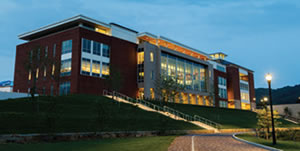Lighting Solutions Promote Community

Lutron’s wireless vacancy sensors and lighting/shade control solutions helped to create a more open, community-minded atmosphere on the campus of Liberty University.
Liberty University in Lynchburg, VA, in the midst of a $500 million campus-rebuilding plan designed to promote a sense of community, encourage stewardship through energy conservation, enhance academic opportunity, and establish the institution firmly in the conversation about prominent, national universities.
Campus-wide, construction projects focus on state-of-the-art facilities with advanced building systems that maximize energy efficiency such as smart, expandable, automatic lighting control systems. Charles Spence, senior vice president for planning and construction, takes a long-term view of campus expansion. One of his goals for rebuilding projects was to standardize a system that provides essential, beautiful lighting and shade control when it is installed and can be expanded easily as the university continues to grow.
Working with Lawrence Perry & Associates, Spence chose Lutron standalone wireless and Quantum Total Light Management systems to deliver energy savings and provide the ability to measure and analyze lighting use. Wireless protocols help to “future proof” the system, allowing changes and reprogramming without rewiring, or otherwise disrupting the previously installed controls.
Lutron’s five corporate principles and 50-year history of product innovation, service, smart control technology and scalable systems gave the team confidence that from products to support systems, Lutron was committed to helping Liberty through the entire process. In residence halls, Lutron’s wireless vacancy sensors in each room reduce energy waste without relying on students to remember to turn off the lights, but students can still turn lights on and off from convenient, wireless wall controls.
Liberty University also understands the importance of encouraging group activities in public areas, thereby fostering a greater sense of community. To create more vibrant, welcoming spaces at any time of the day, the university installed integrated lighting and shade control solutions that automatically change according to time of day and daylight availability. Networked, digital controls offer the ability to standardize solutions across the campus and deliver customized results.
www.lutron.com
This article originally appeared in the issue of .